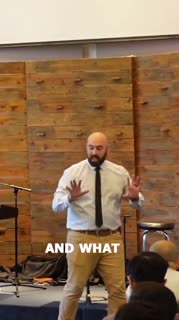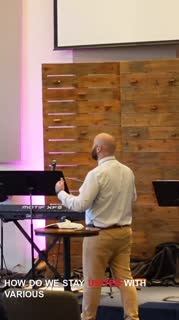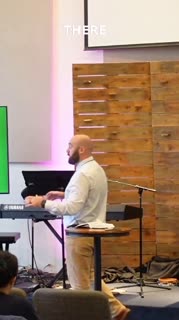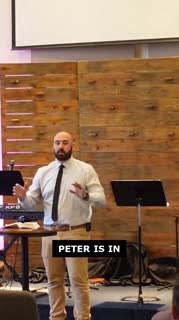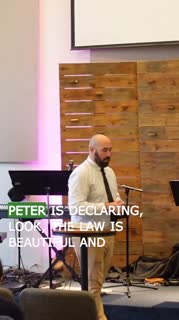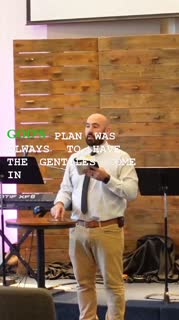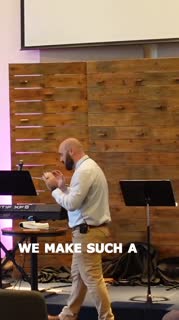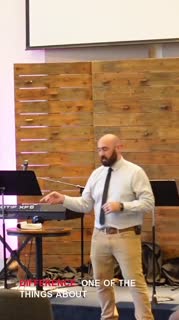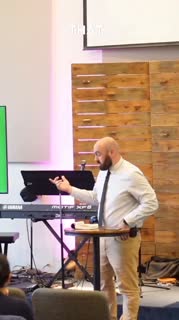Grace, Unity, and Diversity in the Early Church
Devotional
Sermon Summary
Bible Study Guide
Sermon Clips
1) "And what happened was, they were there preaching the gospel and these Jewish teachers came and said, No, you have to start following the whole law of Moses, the whole Old Testament. Circumcision, all the other parts, the ceremonial part, all of the Old Testament law, you need to be keeping it. But we also know there was some other interesting aspects, to this story, because it just so happens that when the Jewish leaders came to teach these things, that Peter, much like a high school kid in the lunchroom, moves from the Gentile table and stops fellowshiping and eating with them, and kind of shuns them a little bit and moves to the popular kids table, the Jewish leaders who came to visit, almost shunning the Gentiles. And Paul, looking at this, was like, Peter, what are you doing? You are shunning our brothers because you feel ashamed of these Gentile believers, these Gentile Christians, and Paul actually rebuked him. And even so much so that he said, Barnabas himself, who was with Paul for all the Gentile missions, he kind of was swayed to, to do the same thing to his Gentile brothers and sisters. So there's also some interpersonal conflict here." [02:10] (65 seconds)
2) "How do we stay united with various cultural expressions of the faith? How do we stay united with brothers and sisters who around the world on this day, September 29th, are worshiping God in different languages, with different songs, different customs, different clothes, different places of worship, in big ones and small homes, in basements and cathedrals. Around the world, people are worshiping God. And it looks so different, right? And if you've gone to different countries and if you've visited a church while you're there, which I love doing, it's one of my favorite things about traveling, right? You visit the local believers and it's so radically different than what you're used to. And yet the Bible says we're united, and yet we're brothers and sisters. We don't speak the same language, we don't have the same culture, we don't have the same upbringing, and yet we're united as brothers and sisters. How does that work? How does the Gospel reach beyond cultural differences?" [06:08] (51 seconds)
3) "There are real differences in the world, right? We have real differences. For someone who practices another faith or another religious way of life, there are so many differences between us that do matter. The way they view the world, the truth that they claim about who God is and what the afterlife is and how one reaches the afterlife and how we are to live and how we are to practice, those are very different for me. I love them, treat them as neighbor, compassion, show grace, all those things, but yet we cannot deny that there are real differences between how we view the world and what we believe and how we live. But then there are differences that really don't make a difference, that really are not about the gospel, they're not about who God is, they're not about the important things that God has laid out about who he is, but are sometimes cultural, sometimes personality based, sometimes ideologically based." [06:55] (47 seconds)
4) "Peter is in humility saying, I can't judge hearts. I can't look into somebody's heart and say, oh, they're a true believer, they have true faith, they have sufficient, they're saved, they're going to heaven, all those things. I can't do that. Only God who knows hearts. He's the one who's able to do that. He declares who it is that is saved. And he's done that by the power of the Holy Spirit. If you remember the story of Cornelius, Peter went to Cornelius and he became saved, he was ready to receive the gospel, he was searching for God, and he received the power of the Holy Spirit. And Peter witnessed this. So he knows this is real, this is from God. Part of the beauty of all the miracles and amazing events that were happening in Acts is to affirm, as something new is being ushered in, what is right, what is of God, and what is not. Through the clear evidence of the power of the Holy Spirit working." [11:00] (52 seconds)
5) "Peter is declaring, look, the law is beautiful and good and given as a way of drawing us into what is good, giving us a standard, something to strive after. But it cannot save us. You cannot outweigh good works and bad works. You cannot make such a balance as to then live a life of righteousness. We need grace or undeserved favor. He says, there at the end, he says, but we believe that we will be saved through the grace of the Lord Jesus just as they are. We're not saved by the law. Why should we expect them to be?" [14:33] (38 seconds)
6) "God's plan was always to have the gentiles come in god's plan was always to have the promise made to asial spread throughout the entire world god's plan was always to do this work of grace it was never changed god is the same god and his plan was there written in the old testament spoken by the prophets so that israel could know in fact the old testament we see is god choosing israel not to be a nation secluded not to be a people that are just kept just for them for his glory you know they were meant to be a nation of priests who proclaimed his glory to the rest of the world that's why he gave them the law of moses to call them to something higher and greater to sanctify them so that they could priesthood the good news of the promise to the world and we see how they succeeded rahab brought in of the line of david of the line of jesus ruth brought in at the line of david of the line of jesus beautiful stories of men and women who saw the promise understood the promise and became a part of the promise" [17:43] (66 seconds)
7) "We make such a focus on the differences that don't make a difference we make such a big fuss such a big argument such a big division and god is saying look god loves your solemn assemblies he loves the sacrifices he loves the songs when they come from a heart turned towards him but dare we ever let our songs our our traditions our meetings our sunday services become empty and broken and something that god then finds despicable because we have forgotten justice we forgot true righteousness we need to return to the core and this is part of of James' speech he said we return to the core and realize that it was never about all this stuff it was always about the justice of God the promise of God's restoration the righteousness that comes through faith just as it was for Abraham just as it was for Isaac and Jacob through faith not based upon trying to keep these laws" [20:20] (66 seconds)
8) "Differences that don't make a difference. One of the things about those things, if you read in Romans 14 as well, what would it take for me to say, okay, can I make some concessions here? He's asking of the Gentiles, okay, you know, this isn't what I'm going to do. This isn't one of those differences that make a difference. You don't have to keep the law of Moses. But if you could just make it a little bit easier on the Jewish people, on the preaching of the gospel, just be a little bit easier for them, if you could just not strangle things when things are blood. And so oftentimes, in areas where we are debating our ideas or preferences or personalities or whatever it may be, we have this feeling of, no, everyone else should make me feel comfortable. Everyone else should appease my whims. When often, really, the resolution is found in concessions on both sides. For me to say, okay, how do I sacrifice maybe some of my comfort or some of my personality and my desires for the sake of the brother, especially and really only in those things that don't make a difference, so that we can focus on the main thing." [24:43] (62 seconds)
9) "The good news is that God still uses everything because he's God and we're not and Paul and Silas went on to do great missionary work and Barnabas and John Mark went on to do great missionary work and God doubled the ministry in that way and later Paul does write about being reconciled to Barnabas and references him with love and same with John Mark so we have to thank him for his solution but we see all throughout Acts 15 there's this emphasis on differences that make a difference what is the truth of the matter what are things that we say this is what's called an exclusive truth this is true, this cannot be true so we hold to this truth this is what God has revealed to us this is who he is this is what the good news of Jesus is and what are those things that we can make concessions on and we can disagree on and we can be united even though we disagree on and understanding that God is a good man those differences and knowing that they all come back to exactly what Peter and James were saying. The core, it's not about the outward things that we're doing. It's not about the good works that we try to put on. It's not about our traditions or our ceremonies or our solemn assemblies. It's all about the grace of God. If the grace of God is working in you and the grace of God is working with me, then we are united. That's truly the core of the gospel. It's the core of God's message of redemption to the world. From the Old Testament to the New, God's plan was always to bring restoration by His power, by His grace and truth and righteousness, not by works of the law, not by good works because we were saved by faith alone, by grace and Jesus alone." [28:50] (97 seconds)
Ask a question about this sermon
2) "How do we stay united with various cultural expressions of the faith? How do we stay united with brothers and sisters who around the world on this day, September 29th, are worshiping God in different languages, with different songs, different customs, different clothes, different places of worship, in big ones and small homes, in basements and cathedrals. Around the world, people are worshiping God. And it looks so different, right? And if you've gone to different countries and if you've visited a church while you're there, which I love doing, it's one of my favorite things about traveling, right? You visit the local believers and it's so radically different than what you're used to. And yet the Bible says we're united, and yet we're brothers and sisters. We don't speak the same language, we don't have the same culture, we don't have the same upbringing, and yet we're united as brothers and sisters. How does that work? How does the Gospel reach beyond cultural differences?" [06:08] (51 seconds)
3) "There are real differences in the world, right? We have real differences. For someone who practices another faith or another religious way of life, there are so many differences between us that do matter. The way they view the world, the truth that they claim about who God is and what the afterlife is and how one reaches the afterlife and how we are to live and how we are to practice, those are very different for me. I love them, treat them as neighbor, compassion, show grace, all those things, but yet we cannot deny that there are real differences between how we view the world and what we believe and how we live. But then there are differences that really don't make a difference, that really are not about the gospel, they're not about who God is, they're not about the important things that God has laid out about who he is, but are sometimes cultural, sometimes personality based, sometimes ideologically based." [06:55] (47 seconds)
4) "Peter is in humility saying, I can't judge hearts. I can't look into somebody's heart and say, oh, they're a true believer, they have true faith, they have sufficient, they're saved, they're going to heaven, all those things. I can't do that. Only God who knows hearts. He's the one who's able to do that. He declares who it is that is saved. And he's done that by the power of the Holy Spirit. If you remember the story of Cornelius, Peter went to Cornelius and he became saved, he was ready to receive the gospel, he was searching for God, and he received the power of the Holy Spirit. And Peter witnessed this. So he knows this is real, this is from God. Part of the beauty of all the miracles and amazing events that were happening in Acts is to affirm, as something new is being ushered in, what is right, what is of God, and what is not. Through the clear evidence of the power of the Holy Spirit working." [11:00] (52 seconds)
5) "Peter is declaring, look, the law is beautiful and good and given as a way of drawing us into what is good, giving us a standard, something to strive after. But it cannot save us. You cannot outweigh good works and bad works. You cannot make such a balance as to then live a life of righteousness. We need grace or undeserved favor. He says, there at the end, he says, but we believe that we will be saved through the grace of the Lord Jesus just as they are. We're not saved by the law. Why should we expect them to be?" [14:33] (38 seconds)
6) "God's plan was always to have the gentiles come in god's plan was always to have the promise made to asial spread throughout the entire world god's plan was always to do this work of grace it was never changed god is the same god and his plan was there written in the old testament spoken by the prophets so that israel could know in fact the old testament we see is god choosing israel not to be a nation secluded not to be a people that are just kept just for them for his glory you know they were meant to be a nation of priests who proclaimed his glory to the rest of the world that's why he gave them the law of moses to call them to something higher and greater to sanctify them so that they could priesthood the good news of the promise to the world and we see how they succeeded rahab brought in of the line of david of the line of jesus ruth brought in at the line of david of the line of jesus beautiful stories of men and women who saw the promise understood the promise and became a part of the promise" [17:43] (66 seconds)
7) "We make such a focus on the differences that don't make a difference we make such a big fuss such a big argument such a big division and god is saying look god loves your solemn assemblies he loves the sacrifices he loves the songs when they come from a heart turned towards him but dare we ever let our songs our our traditions our meetings our sunday services become empty and broken and something that god then finds despicable because we have forgotten justice we forgot true righteousness we need to return to the core and this is part of of James' speech he said we return to the core and realize that it was never about all this stuff it was always about the justice of God the promise of God's restoration the righteousness that comes through faith just as it was for Abraham just as it was for Isaac and Jacob through faith not based upon trying to keep these laws" [20:20] (66 seconds)
8) "Differences that don't make a difference. One of the things about those things, if you read in Romans 14 as well, what would it take for me to say, okay, can I make some concessions here? He's asking of the Gentiles, okay, you know, this isn't what I'm going to do. This isn't one of those differences that make a difference. You don't have to keep the law of Moses. But if you could just make it a little bit easier on the Jewish people, on the preaching of the gospel, just be a little bit easier for them, if you could just not strangle things when things are blood. And so oftentimes, in areas where we are debating our ideas or preferences or personalities or whatever it may be, we have this feeling of, no, everyone else should make me feel comfortable. Everyone else should appease my whims. When often, really, the resolution is found in concessions on both sides. For me to say, okay, how do I sacrifice maybe some of my comfort or some of my personality and my desires for the sake of the brother, especially and really only in those things that don't make a difference, so that we can focus on the main thing." [24:43] (62 seconds)
9) "The good news is that God still uses everything because he's God and we're not and Paul and Silas went on to do great missionary work and Barnabas and John Mark went on to do great missionary work and God doubled the ministry in that way and later Paul does write about being reconciled to Barnabas and references him with love and same with John Mark so we have to thank him for his solution but we see all throughout Acts 15 there's this emphasis on differences that make a difference what is the truth of the matter what are things that we say this is what's called an exclusive truth this is true, this cannot be true so we hold to this truth this is what God has revealed to us this is who he is this is what the good news of Jesus is and what are those things that we can make concessions on and we can disagree on and we can be united even though we disagree on and understanding that God is a good man those differences and knowing that they all come back to exactly what Peter and James were saying. The core, it's not about the outward things that we're doing. It's not about the good works that we try to put on. It's not about our traditions or our ceremonies or our solemn assemblies. It's all about the grace of God. If the grace of God is working in you and the grace of God is working with me, then we are united. That's truly the core of the gospel. It's the core of God's message of redemption to the world. From the Old Testament to the New, God's plan was always to bring restoration by His power, by His grace and truth and righteousness, not by works of the law, not by good works because we were saved by faith alone, by grace and Jesus alone." [28:50] (97 seconds)
